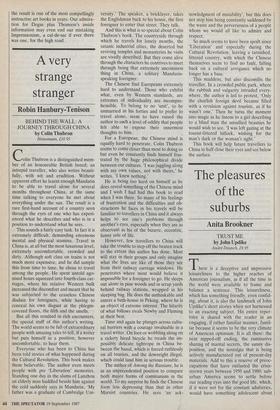A very
strange stranger
Robin Hanbury-Tenison
BEHIND THE WALL: A JOURNEY THROUGH CHINA by Colin Thubron Heinemann, 110.95 Colin Thubron is a distinguished mem- ber of an honourable British breed; an intrepid traveller, who also writes beauti- fully, with wit and erudition. Without apparent effort he learnt enough Mandarin to be able to travel alone for several months throughout China, at the same time talking to everyone he met about everything under the sun. The result is a rare first-hand account of a country seen through the eyes of one who has experi- enced what he describes and who is in a position to understand what he sees.
This sounds a fairly easy task. In fact it is extremely difficult, demanding enormous mental and physical stamina. Travel in China is, at all but the most luxurious level, extremely uncomfortable, crowded and dirty. Although soft class on trains is not much more expensive, and he did sample this from time to time, he chose to travel among the people. He spent untold ago- nised hours squeezed into fourth-class car- riages, where his relative Western bulk increased the discomfort and meant that he was subjected to the ceaseless Chinese disdain for foreigners, while having to conceal his own disgust at the phlegm- covered floors, the filth and the smells.
But all this resulted in rich encounters, the special stuff of this author's writing. The world seems to be full of extraordinary people with amazing tales to tell, if a writer but puts himself in a position, however uncomfortable, to hear them.
Everyone who has been to China has been told stories of what happened during the Cultural Revolution. This book makes them believable. The author even meets people with pre 'Liberation' memories. Standing one day in the slums of Lanzhou an elderly man huddled beside him against the cold suddenly says in Mandarin, 'My father was a graduate of Cambridge Uni-
versity.' The speaker, a bricklayer, takes the Englishman back to his house, the first foreigner to enter that street. They talk.
And this is what is so special about Colin Thubron's book. The countryside through which he travels for lonely months, the satanic industrial cities, the deserted but reviving temples and monasteries he visits are vividly described. But they come alive through the characters he contrives to meet through being that extremely uncommon thing in China, a solitary Mandarin- speaking foreigner.
The Chinese find Europeans extremely hard to understand. Those who exhibit what, even by Western standards, are extremes of individuality are incompre- hensible. To belong to no 'unit', to be unmarried in his forties and to prefer to travel alone, seem to have raised the author to such a level of oddity that people felt able to expose their innermost thoughts to him.
For a European, the Chinese mind is equally hard to penetrate. Colin Thubron seems to come closer than most to doing so but even he constantly finds himself frus- trated by the huge philosophical divide between our cultures. 'I was juggling along with my own values, not with theirs,' he writes. 'I knew nothing.'
He is being too hard on himself as he does reveal something of the Chinese mind and I wish I had had this book to read when I was there. So many of his feelings of frustration and the difficulties and ob- structions he faces in his travels will be familiar to travellers in China and it always helps to see one's problems through another's eyes, especially when they are as observant as his of the bizarre, eccentric, funny side of life.
However, few travellers to China will take the trouble to step off the beaten track to the extent this author has done. Most will stay in their groups and only imagine what the lives are like of those they see from their railway carriage windows. He penetrates where most would believe it impossible for a foreigner to go. He sleeps out alone in pine woods and in scrap yards behind railway stations, wrapped in his sleeping bag. He does the unthinkable and enters a bath-house in Peking, where he is an object of extreme interest. The hilarity of what follows rivals Newby and Fleming at their best.
Time and again he plunges across cultu- ral barriers with a courage invaluable in a travel writer. On foot or wobbling along on a rickety hired bicycle he treads the im- possibly delicate tightrope in China be- tween the banal, which is forced ruthlessly on all tourists, and the downright illegal, which could land him in serious trouble.
The author of Among the Russians, he is in an unprecedented position to compare both major forms of communism in the world. To my surprise he finds the Chinese form less depressing than that in other Marxist countries. He sees 'an ack-
nowledgment of mutability', but this does not stop him being constantly saddened by the waste and the perverseness of a people whom we would all like to admire and respect.
So much seems to have been spoilt since 'Liberation' and especially during the Cultural Revolution, leaving a tarnished, littered country, with which the Chinese themselves seem to find no fault, falling back on a cultural arrogance which no longer has a base.
This maddens, but also discomfits the traveller. In a crowded public park, where the rubbish and vulgarity intruded every- where, the author is led to protest, 'Only the churlish foreign devil became filled with a revulsion against tourists, as if he wasn't one.' Then he turns the moment into magic as he listens to a girl describing to a blind man the unsullied beauties he would wish to see. 'I was left gazing at the tourist-littered hillock, wishing for the man's dark or the woman's sight.'
This book will help future travellers to China to half close their eyes and see below the surface.


































































 Previous page
Previous page